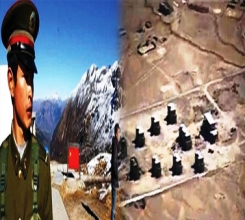By Shastri Ramachandran* | IDN-InDepth NewsAnalysis
NEW DELHI (IDN) – The 16th round of talks between the Special Representatives (SRs) of India and China on the boundary issue, which was held in Beijing on June 28 and 29, was not just another round of jaw-jaw towards resolving the border dispute. The meeting had acquired greater significance because it is the first after the April 15 incursion by Chinese troops in Depsang in eastern Ladakh, and was held less than a week before defence minister AK Antony’s visit to China.
In the view of some observers, the Chinese incursion had strained bilateral relations to a level unprecedented since the 1962 conflict. So much so that there were calls for cancellation of not only external affairs minister Salman Khurshid’s visit to China in May but also Chinese premier Li Keqiang’s visit to Delhi the same month. However, with China making amends and India not pushing for a confrontation, both visits went as scheduled although Premier Li’s visit – his first foreign stop since assuming office in the decadal power shift – did not evoke the expected enthusiasm.
As the visits of both Khurshid and Li were in the immediate aftermath of the strains caused by the Ladakh incursion, the boundary talks acquired unusual significance. Besides, in this round China had a new SR to negotiate with National Security Adviser Shivshankar Menon. The new SR is China’s former foreign minister Yang Jiechi, who became state councillor in the leadership change, and took the place of Dai Bingguo who had been SR from 2003.
Although a commerce ministry delegation travelled to Beijing after Premier Li’s visit, it was felt that the meeting of SRs would also be an occasion to get a sense of the political and diplomatic atmosphere preceding the visit of defence minister AK Antony from July 4. While the uncertainty in bilateral ties which the Depsang incursion gave rise to may not persist, the warmth that characterised India-China relations in recent years is still missing. And, every high-level meet, at least for months to come, would be gauged for the Depsang effect.
The context – Depsang incursion – also decided the content of the 16th round: the talks focused on ways of tightening mechanisms to prevent recurrence of such incidents involving Chinese troops. In the normal course, the talks would have been confined to the agenda of negotiating a framework to resolve the dispute, which is the second of the three-phase process in the boundary talks.
The first stage – on the political parameters for resolving the boundary dispute – ended with an agreement in 2005. Once the framework is agreed upon, the talks would move to the final phase of actually delineating the border. (The just-concluded round also sought to give new momentum to the framework negotiations, which have dragged on for too long).
The Depsang incident underscored the need for improving border management and further confidence-building measures. These steps, along with better border communication, are certain to be written into the Border Defence Cooperation Agreement (BDCA) which figured high on the agenda in the 16th round.
Both sides are now going the extra mile to play down the Ladakh stand-off so that it does not loom large over other India-China engagements, such as the visit of the defence minister. The last visit by a defence minister was in 2006 when Pranab Mukherjee held the portfolio.
Border mechanisms, CBMs and BDCA may be reassuring after the April 15 incident. But in a situation where both sides persist with their respective claims in disputed areas, the urgency to reconcile the overlapping perceptions of the Line of Actual Control (LAC) is all too obvious.
*The author, an independent political and foreign affairs commentator, is a former senior editor of China Daily and the Global Times in Beijing. A version of this article appeared on Daily News & Analysis (DNA) on July 2 and is published here by arrangement with the writer. [IDN-InDepthNews – July 2, 2013]
2013 IDN-InDepthNews | Analysis That Matters
Shastri Ramachandran’s previous articles at IDN:
http://www.indepthnews.info/index.php/search?searchword=shastri%20ramachndran&ordering=newest&searchphrase=any
Image credit: post.jagran.com
Send your comment | Subscribe to IDN newsletter
Follow us on Twitter and Facebook:
http://twitter.com/InDepthNews
http://www.facebook.com/IDN.GoingDeeper

